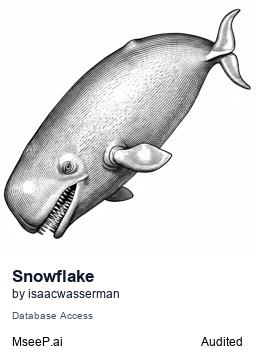What is mcp-snowflake-server
Snowflake MCP Server
Overview
A Model Context Protocol (MCP) server implementation that provides database interaction with Snowflake. This server enables running SQL queries via tools and exposes data insights and schema context as resources.
Components
Resources
-
memo://insights
A continuously updated memo aggregating discovered data insights.
Updated automatically when new insights are appended via theappend_insighttool. -
context://table/{table_name}
(If prefetch enabled) Per-table schema summaries, including columns and comments, exposed as individual resources.
Tools
The server exposes the following tools:
Query Tools
-
read_query
ExecuteSELECTqueries to read data from the database.
Input:query(string): TheSELECTSQL query to execute
Returns: Query results as array of objects
-
write_query(enabled only with--allow-write)
ExecuteINSERT,UPDATE, orDELETEqueries.
Input:query(string): The SQL modification query
Returns: Number of affected rows or confirmation
-
create_table(enabled only with--allow-write)
Create new tables in the database.
Input:query(string):CREATE TABLESQL statement
Returns: Confirmation of table creation
Schema Tools
-
list_databases
List all databases in the Snowflake instance.
Returns: Array of database names -
list_schemas
List all schemas within a specific database.
Input:database(string): Name of the database
Returns: Array of schema names
-
list_tables
List all tables within a specific database and schema.
Input:database(string): Name of the databaseschema(string): Name of the schema
Returns: Array of table metadata
-
describe_table
View column information for a specific table.
Input:table_name(string): Fully qualified table name (database.schema.table)
Returns: Array of column definitions with names, types, nullability, defaults, and comments
Analysis Tools
append_insight
Add new data insights to the memo resource.
Input:insight(string): Data insight discovered from analysis
Returns: Confirmation of insight addition
Effect: Triggers update ofmemo://insightsresource
Usage with Claude Desktop
Installing via Smithery
To install Snowflake Server for Claude Desktop automatically via Smithery:
npx -y @smithery/cli install mcp_snowflake_server --client claude
Installing via UVX
"mcpServers": {
"snowflake_pip": {
"command": "uvx",
"args": [
"--python=3.12", // Optional: specify Python version <=3.12
"mcp_snowflake_server",
"--account", "your_account",
"--warehouse", "your_warehouse",
"--user", "your_user",
"--password", "your_password",
"--role", "your_role",
"--database", "your_database",
"--schema", "your_schema"
// Optionally: "--allow_write"
// Optionally: "--log_dir", "/absolute/path/to/logs"
// Optionally: "--log_level", "DEBUG"/"INFO"/"WARNING"/"ERROR"/"CRITICAL"
// Optionally: "--exclude_tools", "{tool_name}", ["{other_tool_name}"]
]
}
}
Installing Locally
-
Install Claude AI Desktop App
-
Install
uv:
curl -LsSf https://astral.sh/uv/install.sh | sh
- Create a
.envfile with your Snowflake credentials:
SNOWFLAKE_USER="xxx@your_email.com"
SNOWFLAKE_ACCOUNT="xxx"
SNOWFLAKE_ROLE="xxx"
SNOWFLAKE_DATABASE="xxx"
SNOWFLAKE_SCHEMA="xxx"
SNOWFLAKE_WAREHOUSE="xxx"
SNOWFLAKE_PASSWORD="xxx"
# Alternatively, use external browser authentication:
# SNOWFLAKE_AUTHENTICATOR="externalbrowser"
-
[Optional] Modify
runtime_config.jsonto set exclusion patterns for databases, schemas, or tables. -
Test locally:
uv --directory /absolute/path/to/mcp_snowflake_server run mcp_snowflake_server
- Add the server to your
claude_desktop_config.json:
"mcpServers": {
"snowflake_local": {
"command": "/absolute/path/to/uv",
"args": [
"--python=3.12", // Optional
"--directory", "/absolute/path/to/mcp_snowflake_server",
"run", "mcp_snowflake_server"
// Optionally: "--allow_write"
// Optionally: "--log_dir", "/absolute/path/to/logs"
// Optionally: "--log_level", "DEBUG"/"INFO"/"WARNING"/"ERROR"/"CRITICAL"
// Optionally: "--exclude_tools", "{tool_name}", ["{other_tool_name}"]
]
}
}
Notes
- By default, write operations are disabled. Enable them explicitly with
--allow-write. - The server supports filtering out specific databases, schemas, or tables via exclusion patterns.
- The server exposes additional per-table context resources if prefetching is enabled.
- The
append_insighttool updates thememo://insightsresource dynamically.
License
MIT
Leave a Comment
Frequently Asked Questions
What is MCP?
MCP (Model Context Protocol) is an open protocol that standardizes how applications provide context to LLMs. Think of MCP like a USB-C port for AI applications, providing a standardized way to connect AI models to different data sources and tools.
What are MCP Servers?
MCP Servers are lightweight programs that expose specific capabilities through the standardized Model Context Protocol. They act as bridges between LLMs like Claude and various data sources or services, allowing secure access to files, databases, APIs, and other resources.
How do MCP Servers work?
MCP Servers follow a client-server architecture where a host application (like Claude Desktop) connects to multiple servers. Each server provides specific functionality through standardized endpoints and protocols, enabling Claude to access data and perform actions through the standardized protocol.
Are MCP Servers secure?
Yes, MCP Servers are designed with security in mind. They run locally with explicit configuration and permissions, require user approval for actions, and include built-in security features to prevent unauthorized access and ensure data privacy.
Related MCP Servers
Ableton Live MCP Server
MCP Server implementation for Ableton Live OSC control
Airbnb MCP Server
AI Agent Marketplace Index Search MCP Server
MCP Server for AI Agent Marketplace Index from DeepNLP
Algorand MCP Implementation
Algorand Model Context Protocol (Server & Client)
mcp-server-apache-airflow
pypi.org/project/mcp-server-apache-airflow/
airtable-mcp-server
🗂️🤖 Airtable Model Context Protocol Server, for allowing AI systems to interact with your Airtable bases
Airtable MCP Server
Search, create and update Airtable bases, tables, fields, and records using Claude Desktop and MCP (Model Context Protocol) clients
Alphavantage MCP Server
A MCP server for the stock market data API, Alphavantage API.
Amadeus MCP Server
Amadeus MCP(Model Context Protocol) Server
Anki MCP Server
An MCP server for Anki
Submit Your MCP Server
Share your MCP server with the community
Submit Now

